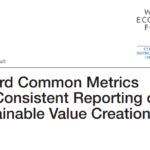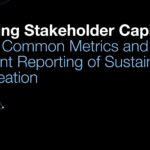
Once upon a time there was a glimmer of hope that accountants could save the planet. The motivation for this report is unclear and expressed differently in different parts. But it is not going to save the planet.
Stakeholder Capitalism and Sustainable Value Creation are not enough
The White Paper Measuring Stakeholder Capitalism: Towards Common Metrics and Consistent Reporting of Sustainable Value Creation released by the World Economic Foundation (WEF) and the Big 4 this month is designed to simplify sustainability reporting recommending that companies report against just 21 core metrics. “They focus primarily on activities within an organization’s own boundaries.” (p6)
This is not enough to maximise value for stakeholders – never mind lead companies on a path to contributing to sustainable development. The importance of the SDGs is mentioned, and the SDG symbols are scattered around the paper, misleading the uninformed reader to thinking saving the planet and its people is the goal. ‘Sustainable value creation’ is not sustainable development.
A clue to a possible purpose of the document is found on page 6: “The metrics should be capable of verification and assurance, to enhance transparency and alignment among corporations, investors and all stakeholders.” The 21 metrics can be assured with little risk to the assurance provider and hence at (relatively) low cost. This is a solution to criticism of the Big 4 for failure to provide a value-for-money assurance offering that is both widely accessible (a cost issue) and covering the processes that sit behind a sustainability or integrated report. Yet it is those processes – the management approach, development of strategy and governance oversight – and transparency of them – that lead to change.
The core and expanded indicators are mostly drawn from GRI Standards. How much funding the Big 4 are providing for the development of the GRI Standards? How much funding are they providing for independent academic research to inform the further development of Standards/frameworks? How does that funding compare with a) the resources put into the development and marketing of this report; or b) the revenue the Big 4 earn from sustainability reporting related work with clients? [The report states (p13): “The recommended core and expanded metrics and disclosures in this report were developed by teams assembled by the Big Four accounting firms.”] Perhaps there were more people working on this than the entire GRI Standards team.
A limited number of standardised metrics are not going to protect long term value for organizations, their stakeholders, society more broadly or the planet. Reporting a few indicators does not lead to change. The addition of a fourth ‘pillar’ (governance) to a triple bottom line approach is not going to preserve value. Having the Big 4 verify the accuracy of these metrics is little comfort if business continues as usual. The concept of pillars fails to encourage integrated thinking about the interdependency of sustainable development issues.
The approach is not informed by relevant academic research nor a conceptual framework
The approach set out by WEF and the Big 4 is not informed by the substantial body of independent academic research on the topic of sustainability reporting or what leads companies down the path of sustainability development. It is not informed by a conceptual framework. The 12 groups of respondents to the consultation do not include academics. In fact, 46% of responses came from companies, 32% from investors leaving just 22% coming from the stakeholders that apparently stand to benefit from this ‘stakeholder capitalism’. It is unclear whether any of those stakeholders represent the environment.
The website hosting the report states that it: “seeks to improve the ways that companies measure and demonstrate their contributions towards creating more prosperous, fulfilled societies and a more sustainable relationship with our planet.” But I’m unsure. Why would they think they could do that better than the organisations whose metrics they draw in, with all their governance and multi-stakeholder consultation processes?
There is a real risk that accountants, perhaps unwittingly, will make the planet uninhabitable and lead to untold suffering along the way.
We must achieve the SDGs
If we believe, like all the nations that signed up to them, that the achievement of the United Nations Sustainable Development Goals (SDGs) is required to protect humanity, we must also believe that:
“The achievement of the SDGs is critical to creating long term value for providers of finance.” SDGD Recommendations
There are no short cuts. We need a conceptual framework for non-financial reporting that facilitates organisations making a positive impact on contribution to the achievement of the SDGs.
Carol Adams, Professor of Accounting at Durham University Business School and Swinburne Business School




